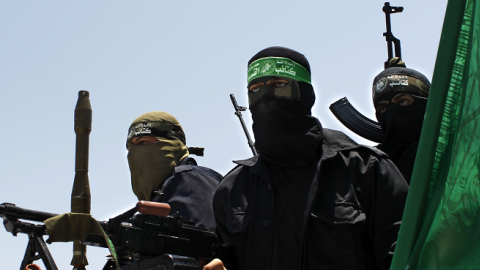In a true cycle, for example a biological one, life is sustained by a progression of changes that begin with new individuals who mature through stages that end in death but reproduce along the way thus completing a cycle. The popular term, “cycle of violence,” that journalists and politicians use to describe the violent relationship between Israel and its enemies is no more a cycle than is the construction of a bridge or road where a particular end is conceived, difficulties in its execution are encountered, and a goal is achieved: this process is linear, not cyclical. Israel’s enemies sought to prevent the existence of the Jewish state by force. Almost seventy years later, the Israeli people are still defending themselves: this, too, is linear.
Looking only at the violent exchanges between Arabs and Israelis that are a defining characteristic of the two sides’ relations offers the appearance of hammer blows one followed by the next: a cycle. But even a blacksmith’s hammering is aimed at something, a nail, a hinge, a plough. Israel aims to be left alone. Her enemies would—and will if presented with the opportunity—destroy her. The conflict is no more a cycle than was any conflict between those who aim to subjugate or destroy and those who seek to be left alone.
Yet U.S. policy rests on the false assumption that the conflict is cyclical and that interrupting it is a legitimate foreign policy goal. U.S. policy should address the root, not the branch. The root is the terrorists’ refusal to acknowledge that Israel is here to stay and their insistence on destroying the Jewish state. The branch is the ensuing conflict.
Israeli policy, in turn, defends the nation most effectively where it attacks the root. Victories on the ground from 1948 to 1972 persuaded surrounding hostile states that military action was a dubious instrument to achieve political objectives. The Hamas terrorists remain unconvinced. They are abetted in their conviction that terror can bring down Israel with the help of Iranian money and support; European opinion, which is reverting to its centuries-old attitude toward Jews; and U.S. policy that sees cycles where it should see a continuum.
Hamas can kidnap and kill Israeli teenagers and as the past few days’ events show. It can increase the range of the rockets launched from Gaza to reach Tel Aviv and the southern perimeters of Jerusalem. But Hamas is vulnerable as it has not been in years, deprived of the former assistance of Syria and the Muslim Brotherhood government in Cairo.
Still, Israel’s air attacks on rocket-launching sites in Gaza and tunnels used to smuggle weapons from Egypt will generate predictable international denouncements of the government in Jerusalem. Crucially, these attacks will not destroy or seriously incapacitate Hamas. But doing so is a worthy strategic objective. It would end or substantially reduce rocket attacks against southern Israel and reduce Israel’s unrelenting need to respond with air and naval force.
Prime Minister Netanyahu correctly observed in a speech delivered late in June that the Syrian civil war, the onslaught against the Iraqi government, and the swift movement of the Islamic State in Iraq and Syria (ISIS) is changing the Middle East’s borders, and that the changes presaged years of “conflict and instability.” Netanyahu also stated his confidence that radical Islamism will eventually fall, as have other totalitarian systems, because it denies human freedom. However, as Daniel Pipes thoughtfully observed, Nazism was indeed defeated but not before it had wrought unprecedented slaughter on and off the battlefield in Europe.
Attacking Hamas on the ground in Gaza and killing its leaders and followers may help bring closer eventual victory in the long war against terrorism. Or it may not. But it will surely diminish the harm that Iranian-supported terror can inflict on Israel and Palestinians who live in the rubble of Gaza.














